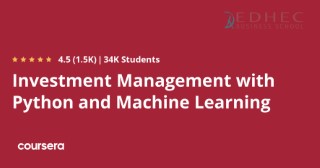Microsoft Azure Machine Learning for Data Scientists
Learn how to create and publish machine learning models without coding using Azure Machine Learning. Prepare for the DP-100 certification exam and gain expertise in operating cloud-scale machine learning solutions with Python and frameworks like Scikit-Learn, PyTorch, and Tensorflow. Explore, prepare, and model data with Azure Databricks and integrate it with Azure Machine Learning for end-to-end solutions.
Machine learning is at the core of artificial intelligence, and many modern applications and services depend on predictive machine learning models. Training a machine learning model is an iterative process that requires time and compute resources. Automated machine learning can help make it easier. In this course, you will learn how to use Azure Machine Learning to create and publish models without writing code.
This is the second course in a five-course program that prepares you to take the DP-100: Designing and Implementing a Data Science Solution on Azurecertification exam.
The certification exam is an opportunity to prove knowledge and expertise operate machine learning solutions at a cloud-scale using Azure Machine Learning. This specialization teaches you to leverage your existing knowledge of Python and machine learning to manage data ingestion and preparation, model training and deployment, and machine learning solution monitoring in Microsoft Azure. Each course teaches you the concepts and skills that are measured by the exam.
This Specialization is intended for data scientists with existing knowledge of Python and machine learning frameworks like Scikit-Learn, PyTorch, and Tensorflow, who want to build and operate machine learning solutions in the cloud. It teaches data scientists how to create end-to-end solutions in Microsoft Azure. Students will learn how to manage Azure resources for machine learning; run experiments and train models; deploy and operationalize machine learning solutions, and implement responsible machine learning. They will also learn to use Azure Databricks to explore, prepare, and model data; and integrate Databricks machine learning processes with Azure Machine Learning.
User Reviews
Be the first to review “Microsoft Azure Machine Learning for Data Scientists”
You must be logged in to post a review.






There are no reviews yet.